
TNO, HUM and the ISSC are jointly developing an ethical chatbot: ‘It is important that communication is tailored to the user’
The ISSC's ICT helpdesk receives dozens of questions from staff and students every day. A collaboration between TNO, LUCL and the ISSC aims to determine whether a specially designed chatbot could provide support in this area.
The idea for the chatbot comes from Professor Stephan Raaijmakers, who specialises in communicative AI. ‘At TNO, I am the scientific leader of a generative AI programme called Grail Generative Responsible AI League,’ he explains. ‘In this programme, we investigate the responsible use of AI for external clients, taking into account issues such as bias, ethics, controllability and privacy. I thought it would be a great case study to develop an ethical chatbot for the ISSC helpdesk.’
Sector plan funds
Sector plan funds subsequently made the project possible, Information Manager Rob Goedemans explains. ‘It’s not often that we, as a faculty institute and service centre, enter into a partnership with an external party. We decided to enter into this special partnership in this particular case because we believe that, as the Faculty of Humanities, we have something to say in the area of ethical AI development. Not only that, TNO was an interesting partner for us.’
'It’s worth noting that “ethical” has a different meaning in this project from in everyday language,' adds ICT and Research Coordinator Auke Ruhe. ‘This project is more about evolving with the customer. How do you train a large language model to be friendly, polite and concise? That’s why we opted for a relatively small language model that can easily be nudged with ALICE, our own computing facility.’
Connecting with the customer
AI champion Julian van der Kraats supervised this process on behalf of the ISSC. ‘The ISSC has a secure environment in which you can work with AI and a database that contains very little personal data. That made us very suitable for this experiment,’ he explains. The ultimate goal is to maintain high customer satisfaction, including through the use of a chatbot. ‘Customer support is partly about technical assistance, but perhaps even more about communication. A response has to be tailored to the individual customer. Commercial chatbots often have that friendliness, but how they work beneath the surface and what “ethical values” they are based on is unclear. With this project, we want to see if we can fine tune that ourselves, so that we can adapt bots to our own standards and values in terms of how we interact with each other.’
The first tests with the new model have now been conducted. ‘We have now delivered a working chatbot. In addition, there is a report detailing the lessons we have learned,’ says Van der Kraats. 'We want to share this as widely as possible with other universities and organisations.' A decision on whether the chatbot will actually be implemented will be made early next year. Van der Kraats: ‘We’ll first run a pilot. Depending on the results, we will decide how to proceed and how it will be financed.’
